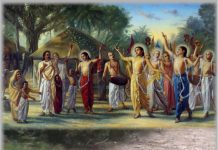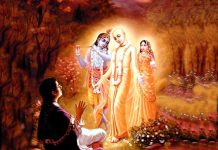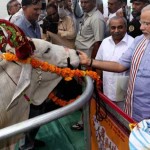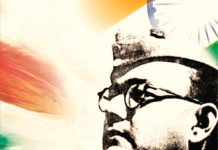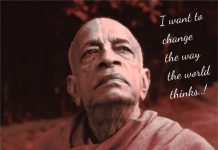A quote from Mr Disney caught my attention. He said “When values are clear decisions are easy.” Profound, isn’t it? Decision making is an inseparable part of leadership. How can one be an effective or even a tolerable leader if he or she doesn’t know which values to base decisions on?
John Spence, a renowned business strategist writes:
“So, for those of you who have not yet written down your personal leadership philosophy, I challenge you to take a few hours and thoughtfully develop a focused and concise list of the key attributes, characteristics, values and behaviors that you personally want to model in order to be a living example of the kind of leader you aspire to be.”
Formerly, the society was led by intelligent class of men. The ruling or administrative class, called Ksatriayas in Sanskrit language, used to get guidance from this intelligent class, called Brahmanas. This intelligent class of men used to derive their wisdom from the scriptures through disciplic succession.
At present, more or less the same system is there but is in a confused state of affairs. For example, the Prime Minister or President of a country is not the sole decision maker. He or she has got a team of advisers. Unfortunately, because the leaders are not well versed in leadership principles, they whimsically end up overruling their advisers’ suggestions.
John Spence continues:
“Remember: People judge you by your actions not by your intentions and what you are speaks so loudly that they can’t hear what you say.
As a leader you live under a microscope, nothing is small, and to be effective you need to consistently lead based on your values, the organization’s values and what is in the best interests of your employees, customers, vendors and community. I believe creating a solid personal leadership philosophy will allow you to do all of that and do it well.”
The Bhagavad-gita (18.42) describes the brahminical qualities in this way:
samo damas tapah saucam ksantir arjavam eva ca
jnanam vijnanam astikyam brahma–karma svabhava–jam
“Peacefulness, self-control, austerity, purity, tolerance, honesty, knowledge, wisdom and religiousness — these are the natural qualities by which the brahmanas work.”
The Mahabharat says:
dharmas ca satyam ca damas tapas ca amatsaryam hris titiksanasuya
yajnas ca danam ca dhrtih srutam ca vratani vai dvadasa brahmanasya
“A brahmana must be perfectly religious. He must be truthful, and he must be able to control his senses. He must execute severe austerities, and he must be detached, humble and tolerant. He must not envy anyone, and he must be expert in performing sacrifices and giving whatever he has in charity. He must be fixed in devotional service and expert in the knowledge of the Vedas. These are the twelve qualifications for a brahmana.”
Understanding every quality of a leader described in the scriptures could be interesting and worth discussing. Interestingly, John also writes a short list of qualities that people think an ideal leader should possess:
- Honesty / integrity/ character
- Visionary
- Highly competent
- Excellent communicator
- Team player/collaborative
- Innovative/risk taker
- Decisive
- Fair and supportive
- Creates clear goals and direction
- Respect/recognition
- Passionate/inspiring
- Personally accountable
- Proactive/action oriented
- Customer/quality focused
Red more on leadership from John at How to Be a Better Leader
It is well-known that India has a treasure of wisdom and the Vedic scripture is the source of it. Great pandits like Chanakya’s and, in the present age, Swami A.C. Bhaktivedanta’s teachings also come from the same source, and that is the reason they proved to be so remarkably successful. By successful, I mean lastingly inspiring.
Contrary to modern leaders who may have shown some temporary achievements and earned praise as leaders, the leaders who changed people’s hearts by instilling in them higher values of life, not just by giving lectures but by practicing it themselves, will be thankfully remembered and praised for their leadership for ages to come. Hare Krishna.



